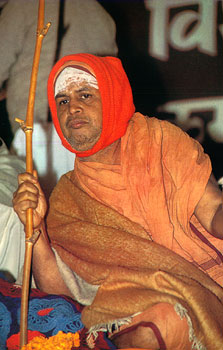
Mark Twain was not the first Westerner to witness the Kumbha Mela. The Kumbha Mela had for many centuries attracted the curiosity of foreign travelers. Megasthenes, the Greek ambassador to the court of King Chandra Gupta, visited Kumbha Mela for seventy-five days in the fourth century B.C. Later, Hieun Tsiang of China toured India in the seventh century A.D. and mentioned Kumbha Mela in his diary. He gave an eyewitness report that during the Hindu month of Magha (January-February), half a million people had gathered on the banks of the Ganges at Allahabad to observe a great celebration. "The pilgrims," writes Hieun Tsiang, "assembled along with their Emperor, Maharaja Harshavardhana, his ministers, scholars, philosophers, and sages." He also reports that the emperor distributed enormous quantities of gold, silver, and jewels in charity to the pilgrims.
Dominated by Buddhism, Jainism, and Islamism in the eighth century, India's ancient spiritual traditions were on the verge of extinction. In an effort to revitalize the ancient traditions, a saint and religious reformer named Shankara popularized the Kumbha Mela as a meeting place for the spiritually inclined. His efforts proved successful, making Kumbha Mela the largest spiritual gathering in the world.
Shankara emphasized the importance of associating with saintly persons while at the Kumbha Mela. Shankara placed more importance on hearing transcendental knowledge with faith and attention from self-realized persons, darshan, than he did on taking a holy bath in the Ganges. According to Shankara, the darshan of saintly persons, who are themselves the personification of truth and purity, can enable one to easily achieve the ultimate stage of self-realization-whereas a holy bath in the Ganges only removes the impediment of bad karma. Thus, both hearing spiritual topics from saints and bathing in the Ganges are still the two main focuses of the people at Kumbha Mela.
